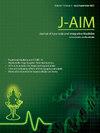Efficacy of Brahmi vati and Aswagandharista in major depressive disorder: A randomized controlled trial
IF 1.7
Q3 INTEGRATIVE & COMPLEMENTARY MEDICINE
引用次数: 0
Abstract
Background
Role of Ayurveda medications in the management of Major depressive disorder (MDD) is explored.
Objective
To evaluate the effect of Brahmi vati and Aswagandarista in the management of MDD.
Methods
Study was a Randomized, Controlled, parallel group comparative clinical trial. Fifty patients meeting the MDD (DSM V) diagnostic criteria from teaching hospital were recruited in the study. They were divided in two 2 groups. Control group were administered with Escitalopram 10 mg twice a day. Ayurveda group were intervened with tablet Brahmi vati 500 mg thrice a day and Liquid Aswagandarista 10 ml thrice a day. Interventions were for 60 days. Assessments were done on every 15th day. Assessments criteria included Hamilton Depression Rating scale (HDRS), Hamilton Anxiety Rating scale (HARS), UKU Side effect scale (UKU), Brief Psychotic Rating Scale (BPRS), WHO quality of life -BREF (WHOQOL-BREF), Pittsburgh Sleep Quality Index (PSQI) and Clinical Global Impression scales (CGI) were assessed at all the time points. Blood parameters like Haemoglobin, Serum creatinine and Liver function tests were evaluated at pre and post study.
Results
Between group comparison showed significant improvements in WHOQOL-Bref (p < 0.001), UKU (p = 0.04) favouring Ayurveda group and PSQI (p = 0.02) improvements in control group. Improvements in other parameters were comparable. Within group assessment showed significant (p < 0.001) improvement in HDRS, HARS, BPRS, CGI-S, CGI-GI in both the groups. Liver function tests and serum creatines were within normative limits.
Conclusion
Ayurveda medications produced significant improvements comparable to escitalopram with additional advantages in quality of life and side effects profile.
婆罗门梵和阿育吠陀治疗重度抑郁症的疗效:一项随机对照试验。
背景:探讨阿育吠陀药物在重度抑郁症(MDD)治疗中的作用。目的:评价婆罗米泻和芦花泻治疗重度抑郁症的疗效。方法:采用随机、对照、平行组对照临床试验。本研究从教学医院招募50例符合重度抑郁症(DSM V)诊断标准的患者。他们被分成两组。对照组患者给予艾司西酞普兰10 mg,每日2次。阿育吠陀组给予婆罗梵片500 mg / d,阿楝液10 ml / d。干预期为60天。每隔15天进行一次评估。评估标准包括汉密尔顿抑郁评定量表(HDRS)、汉密尔顿焦虑评定量表(HARS)、UKU副作用评定量表(UKU)、简短精神病评定量表(BPRS)、WHO生活质量-BREF (WHOQOL-BREF)、匹兹堡睡眠质量指数(PSQI)和临床总体印象量表(CGI)。在研究前后评估血红蛋白、血清肌酐和肝功能等血液参数。结果:组间比较显示WHOQOL-Bref有显著改善(p)。结论:阿育吠陀药物与艾司西酞普兰相比有显著改善,在生活质量和副作用方面有额外的优势。
本文章由计算机程序翻译,如有差异,请以英文原文为准。
求助全文
约1分钟内获得全文
求助全文
来源期刊

Journal of Ayurveda and Integrative Medicine
INTEGRATIVE & COMPLEMENTARY MEDICINE-
CiteScore
4.70
自引率
12.50%
发文量
136
审稿时长
30 weeks
 求助内容:
求助内容: 应助结果提醒方式:
应助结果提醒方式:


